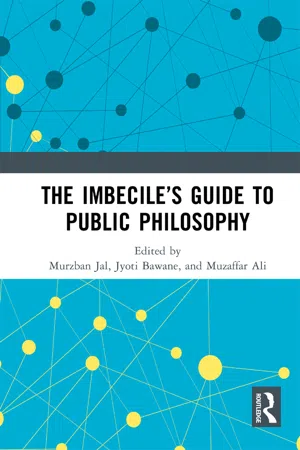
- 210 pages
- English
- ePUB (mobile friendly)
- Available on iOS & Android
The Imbecile's Guide to Public Philosophy
About This Book
This book studies the role of serious philosophizing in everyday life and looks at how authoritarianism negates philosophical and public reason. It sheds light on how philosophy can go beyond its life as a discipline limited to an esoteric group of academia to manifest itself via radical discursive practices in public life which enable us to understand and resolve contemporary socio-political challenges. It studies philosophy as a discipline which deals with one's orientations based on experience, the logic of reasoning, critical thinking, and most of all radical and progressive beliefs.
The book argues that the contemporary rise of capitalism in modern society, resonating Émile Durkheim's cautions on "anomie", has favoured individualism, differentiation, marginalization, and exploitation, balanced on an eroding collective consciousness and a steady disintegration of humanity and reason. Taking this into consideration, it discusses how philosophy, both mainstream and marginal, can revive democracy in society which then is able to confront global authoritarianism led by the figure of the imbecile. Finally, it also provides a range of new perspectives on the questions of civic freedom, hegemony of language, social justice, identity, invisible paradigms, gender justice, democracy, multiculturalism, and decolonization.
This book is an invigorating compilation of essays from diverse disciplines, engaging the need to create a humanistic public philosophy to transcend the state of imbecility. It will be of great interest to students, scholars and researchers of philosophy, contemporary politics, history, and sociology, as well as general readers.
Frequently asked questions
Information
1 Imbecility and its discontents
To write poetry after Auschwitz is barbaric. (Nach Auschwitz ein Gedicht zu schreiben, ist barbarisch).Theodor Adorno, Prisms1
Life is a sexually transmitted disease and the mortality rate is one hundred percent.R.D. Laing, ‘Interview, 1987’2
Introduction: the crisis of Kultur
The German people today is oriented to essentially different values and standards; it talks of and understands a language that is different not only from that of Western civilization but also from that of former German Kultur.4
Only a free Russia, a Russia that had no need either to oppress the Poles, Finns, Germans, Armenians or any other small nations, or constantly to set France and Germany at loggerheads, would enable modern Europe, rid of the burden of war, to breathe freely, would weaken all the reactionary elements in Europe and strengthen the European working class.11
Fascism as “private philosophy”
…in 1933 you identified so strongly with the regime that today in the eyes of many you are considered as one of the strongest intellectual proponents. Your own speeches, writings and treatises from this period are proof thereof. You have never publicly retracted them—not even after 1945. You have never publicly explained that you have arrived at judgments other than those which you expressed in 1933-34 and articulated in your writings. You remained in Germany after 1934, although you could have found a position abroad practically anywhere. You never publicly denounced any of the actions or ideologies of the regime. Because of these circumstances you are still today identified with the Nazi regime. Many us have long awaited a statement from you, a statement that would clearly and finally free you from such identification, a statement that honestly expresses your current attitude about the events that have occurred. But you have never uttered such a statement at least it has never emerged beyond your private sphere. I—and very many others—have admired you as a philosopher; from you we have learned an infinite amount. But we cannot make the separation between Heidegger the philosopher and Heidegger the man, for it contradicts your own philosophy. A philosopher can be deceived regarding political matters; in which case he will openly acknowledge his error. But he cannot be deceived about a regime that has killed millions of Jews—merely because they were Jews—that made terror into an everyday phenomenon, and that turned everything that pertains to the ideas of spirit, freedom and truth into its bloody opposite. A regime that in every respect imaginable was the deadly caricature of the Western tradition that you yourself so forcefully explicated and justified. And if that regime was not the caricature of that tradition but its actual culmination—in this case, too, there could be no deception, for then you would have to indict and disavow this entire tradition … Is this really the way you would like to be remembered in the history of ideas? Every attempt to combat this cosmic misunderstanding founders on the generally shared resistance to taking seriously a Nazi ideologue. Common sense (also among intellectuals), which bears witness to such resistance, refuses to view you as a philosopher, because philosophy and Nazism are irreconcilable.16
Concerning 1933: I expected from National Socialism a spiritual renewal of life in its entirety, a reconciliation of social antagonisms and a deliverance of Western Dasein from the dangers of communism.17
Table of contents
- Cover
- Half Title
- Title Page
- Copyright Page
- Contents
- Contributors
- Acknowledgements
- Preface: Philosophy in the era of Global Evil
- Introduction: Why public philosophy? Why now?
- 1 Imbecility and its discontents
- 2 Public philosophy as critique
- 3 What could be called the philosophical “other”?
- 4 Redistribution, recognition, and participation—Nancy Fraser's theory of justice in Indian social context: An exploration
- 5 Contestations that refuse to die: The battle for language as a primary marker of identity
- 6 Schooling: The invisible paradigm
- 7 De-colonizing solidarity and reciprocity
- 8 Understanding the “other”: A case of Kolkata Marwaris
- 9 Public-private boundary: Conceptual debates on privacy
- Index